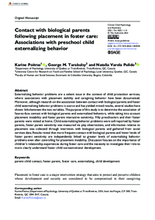Externalizing behavior problems are a salient issue in the context of child protection services, where associations with placement stability and caregiving behavior have been documented. Moreover, although research on the association between contact with biological parents and foster child externalizing behavior problems is scarce and has yielded mixed results, several studies have shown links between the two variables. The purpose of this study is to determine the association of face-to-face contact with biological parents and externalized behaviors, while taking into account placement instability and foster parent interactive sensitivity. Fifty preschoolers and their foster parents were visited at home. Child externalizing behavior problems were self-reported by foster parents, foster parent sensitivity was measured via play observations, and information relative to placement was collected through interviews with biological parents and gathered from social services data. Results reveal that more frequent contact with biological parents and lower levels of foster parent sensitivity are independently linked to greater levels of externalizing behavior problems even after controlling for placement instability. Discussion focuses on the importance of children’s relationship experiences during foster care and the necessity to investigate their role to more clearly understand foster child socioemotional development.

